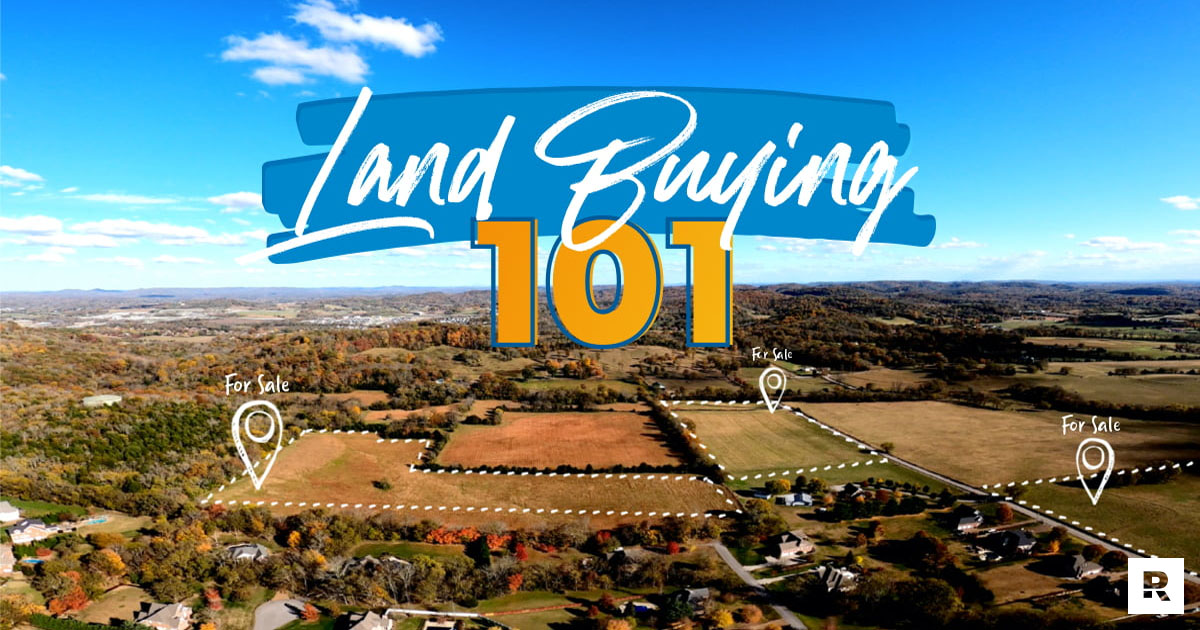
So, you want to buy land? Maybe you have a blueprint for a dream home, and you’re looking for some developed land to build it on. Or you could be looking to invest in undeveloped land just outside of a booming area. Heck, maybe you just want to tear around on a four-wheeler once in a while without disturbing the neighbors. (Hey, we love rednecks around here.)
Whatever the reason, lots of people are interested in land ownership. But how do you buy land?
How to Buy Land
The land-buying process really isn’t all that different from the home-buying process, but there are some key differences between the two.
So, to make sure you don’t miss anything, you’ll want to follow three steps as you navigate the process of buying land—whether you’re doing it so you can build a house or for another reason, like investing.
The three steps for how to purchase land are . . .
- Decide where to buy land.
- Make sure you have enough money to buy land.
- Build a team of all-star pros.
Following those steps is the best way to buy land. Let’s break each of them down.
Step 1: Decide where to buy land.
Even if you’re simply buying land to build a home, you still want to think like an investor. That means you’ll want to buy a property that’s likely to grow in value over time.
To figure out whether a property’s value will go up, you’ll have to do some homework. Do some digging on these seven things before you sign the dotted line.
1. Location
The three most important things in real estate are location, location and location. While you may be fine owning land that’s completely off the grid, you need to think about how a future buyer would feel about that. And here’s a spoiler: Most folks won’t want to drive an hour to reach the nearest signs of civilization—like grocery stores and gas stations.
When you’re evaluating the value of a location, and whether that value is likely to increase, you’ll also need to think about the quality of the school district the property falls into, how close the land is to highways and stores, and its distance from emergency services, like hospitals and fire stations.
2. Zoning
Check with your city, county and state zoning ordinances to see if it’s even possible to build a home on the land you’re looking at—that will affect the land’s value and its potential to grow regardless of whether you want to build. Also find out if the government has any building plans of their own that could impact the land’s value, like new nearby highways or powerplants. Stuff like that is more common than you may think, so watch out!
3. Topography
You need to consider the type of soil, the number of trees, and the elevation or flatness of the terrain. Those are all things that will affect the cost of building a home and the value of the land. For example, if you buy property in the wetlands, you'll have to deal with tough regulations and pay for an expensive septic system.
Performing a full topography assessment is highly technical, which makes it tough if you aren’t trained as a farmer or geologist. That’s part of the reason why you’ll want to get a team of top-notch experts on your side as you navigate the land-buying process (we’ll talk more about that in Step 3).
4. Environmental Concerns
Make sure you’re aware of environmental dangers that could affect your land (like flooding or other natural disasters), as well as any endangered plants or animals living on the property you’re looking at. If you buy in a wooded area, check to see how many trees you’re allowed to clear. This stuff should pop up when you look at zoning regulations and topography, but it’s always better to ask, just in case.
5. Road Access
When you buy land, you need a way to get to it easily. If the roads leading to it are someone else’s private property, you’ll have to get legal permission to use them.
Find expert agents to help you buy your home.
The official term for that is easement, and it may come with a fee and an agreement to share the road maintenance costs. (No, baking cookies for your neighbor won’t get the job done.)
Even though it’s a hassle, easement is incredibly important to figure out before you commit to buying land. If you don’t have an easement, you won’t be able to get to your property—so you may as well not even buy it. Of course, if the roads leading to the land aren’t private property, you’re in the clear!
6. Utility Services
The land might not come with access to city water, electricity, cable lines or sewage systems, which would seriously affect its value. Check the city limits to see if you’ll have to invest time and money into building your own septic system, water well or electricity access. Don’t forget to check your cell service, too, when you visit your potential purchase.
7. CCRs
CCR stands for covenants, conditions and restrictions. These are rules imposed by an HOA or local government that could affect what you’re allowed to do with your property. The land may be perfect for your flamingo farm, but if the CCRs restrict the breeding of pink birds for some reason, you’ll need to look elsewhere.
With the right agent, taking on the housing market can be easy.
Buy or sell your home with an agent the Ramsey team trusts.
Step 2: Make sure you have enough money to buy land.
This is where the reason you’re buying land really comes into play. That’s because the amount of money you should save before buying land depends on whether you plan to build a home, use the land as an investment, or start that flamingo farm.
And by the way, you’ll need to save some cash on the front end either way. If you’re trying to figure out how to buy land with no money, that’s a terrible idea. Buying land (or a house) with no money down is a major financial risk.
So, how much money should you save? Let’s take a look.
If You’re Buying Property to Build a Home
If you’re buying land so you can use it to build a home for your family to live in, the best plan is to pay cash for everything—the land and your future home. If that’s not realistic for you, taking out a loan is okay. But you need to know a few things before you go down that path.
First, you’ll have to take out separate loans for the land and the homebuilding. Getting a land loan is a very different process than getting a mortgage, and the rules are different too. That’s why you’ll want to work with a quality real estate agent, because they’ll be able to help you figure out which type of land loan you need and how much of a down payment is required (more on that later).
When it comes to the homebuilding loan, you’ll want to treat it like a mortgage. That means you’ll want to get a 15-year fixed-rate loan, and you should save up a strong down payment of at least 5–10%. If you can save up a bigger down payment, like 20%, that would be even better because you’d avoid having to pay private mortgage insurance (PMI) .
On top of all that, you need to make sure you’ve checked all of these boxes:
- You’re debt-free. No car payments, student loans or credit card balances.
- You have a fully funded emergency fund that will cover at least 3–6 months of expenses.
- You know that your monthly payments between the land and house loans will be no more than 25% of your monthly take-home income.
If You’re Buying Property as an Investment
If your living situation is squared away and you’re buying land as an investment or for some other reason, taking out a loan is a bad idea. Don’t invest in land (or real estate, for that matter) unless you can pay for it in cash.
Going into debt for an investment will only bring you stress. You’ll have much more peace—and, ultimately, make more money—if you save up to buy land with cash.
You also shouldn’t buy land as an investment unless you’re . . .
- Completely debt-free with a paid-for home.
- Already investing 15% of your pretax income into retirement accounts.
- Saving for your kids to go to college debt-free (if you have kids).
If you haven’t hit all three of those goals yet, that’s where your focus needs to be for now.
Step 3: Build a team of all-star pros.
Once you know where you want to buy land and you’ve got the money to do it, you need to get an all-star team of pros on your side. If you’re planning to build a house, that’ll mean looking for an architect, a contractor or project manager, and a builder. Your team will look a little different (and smaller) if you’re just buying the land as an investment, but you’ll need a good real estate agent either way.
Buying land can be complicated, so you’ll want to work with someone who can help you do it properly! They’ll be able to help you with some of the more technical stuff we’ve talked about, like zoning, land loan requirements, topography and other words that are hard to pronounce.
Next Steps
- After you decide where to buy land, do some online research on price per acre.
- Save for a down payment if you're building a house on the land. If you're buying the land for an investment, save enough to pay cash for it.
- Find a RamseyTrusted real estate pro in your area to help you find and buy a piece of property. They’re experts in their local communities and will take you through all the ins and outs of how to buy land with patience and grace.
Frequently Asked Questions
-
What is the smartest way to buy land?
-
The smartest way to buy land is to hire a top-notch real estate agent, make sure the value of the land you’re buying is likely to increase in value over time, and prepare yourself financially by getting out of debt and saving up a full emergency fund before you buy land.
-
What do I need to buy land in each state?
-
The process of buying land doesn’t change much from state to state. Wherever you choose to buy, you’ll still need to save up enough cash, work with a top-notch real estate agent, and do some research to make sure you’re buying a piece of land that’s likely to go up in value. If there are any state-specific laws or regulations for your area, your agent will be able to help you navigate them.
-
How much money should you save before buying land?
-
If you’re buying land to build a house for you or your family to live in, you should save up enough cash to make a down payment of at least 5–10% of your building loan. A 20% down payment is better, though, because it will keep you from having to pay for private mortgage insurance (PMI). If you’re buying land as an investment, you should save up enough money to pay cash for the land without a loan.


